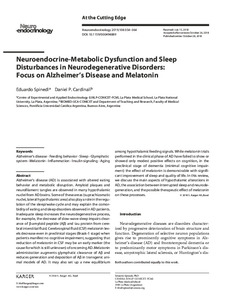Please use this identifier to cite or link to this item:
https://repositorio.uca.edu.ar/handle/123456789/9108| Título: | Neuroendocrine-metabolic dysfunction and sleep disturbances in neurodegenerative disorders: focus on Alzheimer's disease and melatonin | Autor: | Spinedi, Eduardo J. Cardinali, Daniel Pedro |
Palabras clave: | MELATONINA; ENFERMEDAD DE ALZHEIMER; INSULINA; CRONOBIOLOGIA; ALIMENTACIÓN | Fecha de publicación: | 2019 | Editorial: | Karger | Cita: | Spinedi, E. J., Cardinali, D. P. Neuroendocrine-metabolic dysfunction and sleep disturbances in neurodegenerative disorders: focus on Alzheimer's disease and melatonin [en línea]. Neuroendocrinology, 2019, 108(4). doi: 10.1159/000494889. Disponible en: https://repositorio.uca.edu.ar/handle/123456789/9108 | Resumen: | Abstract: Alzheimer’s disease (AD) is associated with altered eating behavior and metabolic disruption. Amyloid plaques and neurofilament tangles are observed in many hypothalamic nuclei from AD brains. Some of these areas (suprachiasmatic nuclei, lateral hypothalamic area) also play a role in the regulation of the sleep/wake cycle and may explain the comorbidity of eating and sleep disorders observed in AD patients. Inadequate sleep increases the neurodegenerative process, for example, the decrease of slow-wave sleep impairs clearance of β-amyloid peptide (Aβ) and tau protein from cerebral interstitial fluid. Cerebrospinal fluid (CSF) melatonin levels decrease even in preclinical stages (Braak-1 stage) when patients manifest no cognitive impairment, suggesting that reduction of melatonin in CSF may be an early marker (the cause for which is still unknown) of oncoming AD. Melatonin administration augments glymphatic clearance of Aβ and reduces generation and deposition of Aβ in transgenic animal models of AD. It may also set up a new equilibrium among hypothalamic feeding signals. While melatonin trials performed in the clinical phase of AD have failed to show or showed only modest positive effects on cognition, in the preclinical stage of dementia (minimal cognitive impairment)the effect of melatonin is demonstrable with significant improvement of sleep and quality of life. In this review, we discuss the main aspects of hypothalamic alterations in AD, the association between interrupted sleep and neurodegeneration, and the possible therapeutic effect of melatonin on these processes. | URI: | https://repositorio.uca.edu.ar/handle/123456789/9108 | ISSN: | 1423-0194 (en línea) 0028-3835 (impreso) |
Disciplina: | MEDICINA | DOI: | 10.1159/000494889 | Derechos: | Acceso abierto | Fuente: | Neuroendocrinology, 2019, 108(4) |
| Appears in Collections: | Artículos |
Files in This Item:
| File | Description | Size | Format | |
|---|---|---|---|---|
| neuroendocrine-metabolic-dysfunction-sleep.pdf | 526,81 kB | Adobe PDF |  View/Open |
Page view(s)
1,133
checked on Jan 21, 2026
Download(s)
1,068
checked on Jan 21, 2026
Google ScholarTM
Check
Altmetric
Altmetric
This item is licensed under a Creative Commons License

